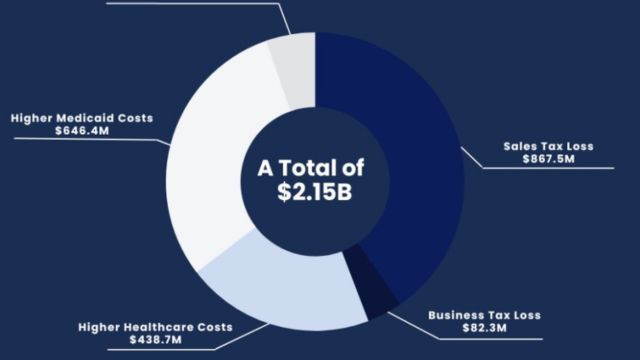MJP News –
The economic burden of obesity is piling up in Florida.
In 2022, the state budget took a hit of $2.15 billion, or 4% of revenue, due to obesity and overweight, according to a recent study by Global Data. The total cost to Florida was $30.1 billion.
Every Floridian ought to pay attention to that sum of money, according to Randall Croom, an associate professor of management at Stetson University.
The impact on Medicaid spending was substantial, amounting to over $650 million in just Florida alone, he stated. As a taxpayer, you are feeling some cost when you start thinking about yourself in that way.
The study also found that Florida spent $2.8 billion in 2022 on health-related disability and absenteeism due to obesity and overweight.

Among other things, he added that insurance firms are now more liable and responsible for the costs associated with obesity-related illnesses, which in turn drives up insurance premiums for individuals.
Croom added that obesity is affecting who can work, which is a problem because insurance is paid for by businesses.
SEE MORE –
Florida Sees $50 Million Drug Haul Offloaded by US Coast Guard
There would be more than 235,000 fewer adults working, according to the analysis, he stated. “People who would have been able to contribute to the economy but were unable to do so because of illness or a premature death are one source of the decline in the labor force participation rate.”
The Florida Department of Health reports that about 64% of the state’s population is overweight or obese.
Volusia County has 66.3% of adults who are obese or overweight, Seminole County 60.3%, and Orange County 65.9%, according to Central Florida, FL Health Charts.
According to Croom, local communities may feel the same or even worse economic effects if their counties are close to the state level.
However, he did say that Seminole County is a model of the correlation between income and health.
“While it’s still 60%, it’s lower than the average for the state. And if you compare Seminole County to other counties in terms of socioeconomic level, you might draw some quite broad conclusions,” he added. “It appears that there are economic factors that impact people’s ability to maintain a healthy weight,” the author writes, “because counties with higher incomes tend to have lower rates of obesity and overweight.”
The Effects of Obesity on the Economy and Workforce in Florida, According to Global Data. Croom stated that there are structural problems that add to the problem of people being overweight or obese, in addition to lifestyle and heredity.
Orlando ranked lowest in walkability among U.S. cities in an April report by Preply.
According to Croom, a significant portion of people’s everyday activities are rendered inactive when they are unable to walk.
He went on to say, “And without city infrastructure that allows people to get that in their daily activities and lives.” He cited studies that found the recommended daily step count for adults to be anywhere from 8,000 to 12,000 steps, depending on age. Well, it’s one of the factors.
Even though most people can’t change a city’s walkability, Croom argued that people may influence the social stigma associated with obesity, which in turn drives economic expenses.
SEE MORE –
Live A Perfect Life! Top 5 Highest Safe Cities In Port Orange, Florida
According to Croom, policymakers would be better able to select appropriate measures if they viewed obesity as a public health emergency.
It can be challenging to find healthy food options and even more challenging to navigate some of the towns in Central Florida.
531,710 people in Central Florida are food insecure, according to Second Harvest Food Bank of Central Florida.
Not having a car or living far from a grocery shop means people may have to settle for less healthy options with longer shelf life, according to Croom.
The availability of foods that do not spoil quickly and can be stored for an extended period of time would have numerous economic benefits, he added. Being able to shop in bulk, prepare your own meals at home, and enjoy the freedom that comes with having a career that lets you do things your way—like cooking a nutritious meal. Some of the hidden financial obstacles to making healthy choices include these.
The National Library of Medicine published a report in 2021 that analyzed the rise in individual expenditures caused by obesity by the state in 2016.
In Florida, for instance, the study found that obesity might raise medical expenses by 24%; in New York, by 66.4%; and in Texas, by 104.9%.
Even if obesity rates had remained unchanged, according to Croom, the expenses related to it would have risen significantly due to the inflation we’ve had since 2016.
“Thus, it’s probable that costs will rise for individuals in central Florida, as well as for business owners and insurance providers,” he stated.
This is why Croom praised the mayor of Deltona for his endeavors and indicated that there are some inexpensive options.
Participants in the Mayor’s Fitness Challenge can choose from a variety of fitness-related events, such as power walks, cycling, and conditioning with the PRHS JROTC.
A lot of wonderful things may be done by individuals on a local level, according to Croom. “Don’t assume anything terrible, painful, or expensive is going to happen as a result of this.”
Croom, on the other hand, claimed that, despite the upfront expenses, the health benefits will result in greater cost savings over time.
Several insurance firms encourage and reward individuals for participating in healthy activities, he added. “Insurance companies have a knack for numbers, and one of their findings is that prevention is cheaper than trying to pay for remediation when people are in a jam.”




